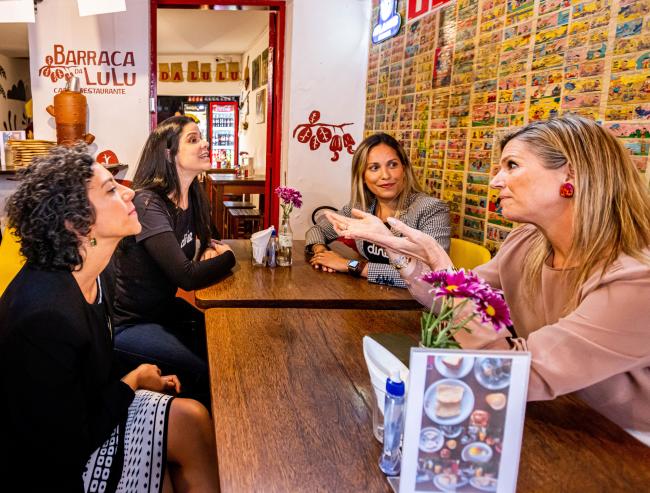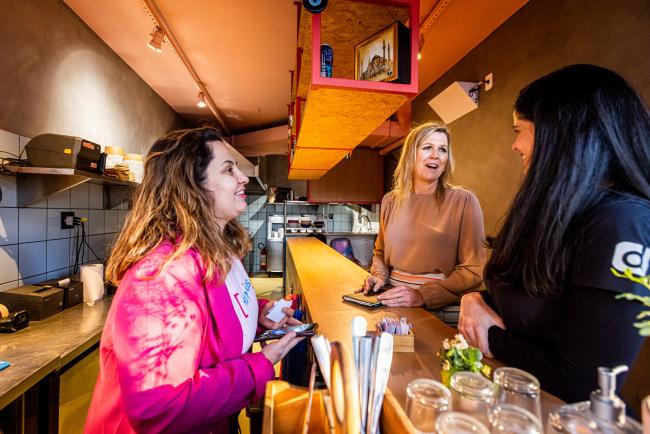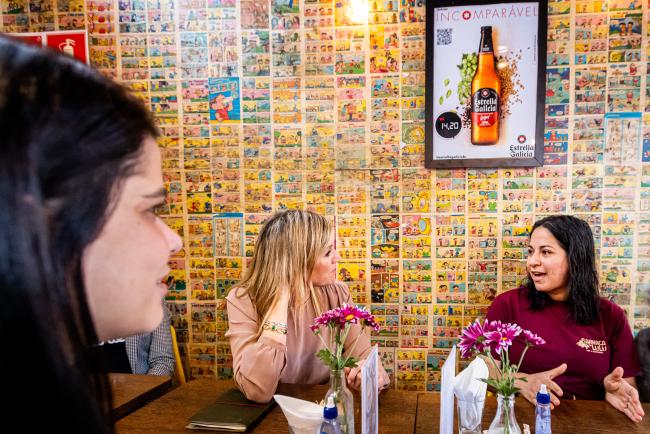In Brazil, micro-, small, and medium-sized enterprises (MSMEs) make up a staggering 99% of all businesses, accounting for 27% of GDP and 55% of formal employment. Yet, this outsized role in the economy has not been matched by access to credit and working capital.
MSMEs have long been underserved by Brazil’s traditional banks, which charge high rates of interest and require a complicated credit application process. Without the financial tools to manage their expenses, grow their business, and weather financial shocks, these economic engines of Brazil are underutilized.
Now, another avenue for financing has opened for MSMEs. Launched in São Paulo in 2019, Dinie is a pioneering fintech that offers embedded lending and digital working capital to MSMEs and merchants on e-commerce platforms. And in a country where less than 5% of startups are founded by women, Dinie is 100% women-led. This group of leaders had the opportunity to meet and discuss their company’s work with UNSGSA Queen Máxima on 5 June 2023 in São Paulo.

Dinie’s vision is for large ecosystems like e-commerce marketplaces to become the “invisible bank” of MSMEs. By forging strategic partnerships with Brazil’s largest e-commerce platforms and with backing from global fintech funds, Dinie embeds its infrastructure and financial services on platforms that MSMEs already use and trust, like iFood and Rappi. This is opening access to tailored, affordable, and effortless financial products and fostering the growth of MSMEs.
By operating on major e-commerce platforms, Dinie can reach large pools of potential customers. It has already served nearly 4,000 merchants and facilitated more than 15,000 microloans, economically empowering MSMEs through their transactional data. Dinie uses this data to quickly approve and underwrite revolving credit, monitor cash flow and repayment behaviors to adjust credit lines, and approve new drawdowns without additional paperwork.

Talita Silveira, 36, is one small business owner who has benefited from Dinie credit. Inspired by the cuisines of the Middle East, Silveira and her chef husband Fred Caffarena, 32, launched Diaspora (Make Hommus Not War), the first restaurant in Brazil offering hummus-centric dishes, in 2020.
Opening in the middle of the COVID-19 pandemic meant the couple had to focus exclusively on delivery, using their former restaurant, Firin Salonu, as a base. In 2022, they moved the restaurant to the Pinheiros neighborhood of São Paulo and began expanding it to two floors with a courtyard. Pressured with debts and refurbishment costs, Silveira explained to Queen Máxima that she used Dinie credit to fund the remodel. With a credit line and working capital, Silveira has not only been able to sustain the business through tough economic times but steer it with confidence to a new phase of growth.
40-year-old Luciana Reís has also been navigating the ups and downs of running a restaurant during a pandemic and economic downturn. Her restaurant career began with a small stand at a bus stop, selling egg custard pastries called pastéis, and tapioca crepes, which she learned how to make from her father growing up in Piauí, a small town in northeast Brazil.

The popularity of her stand led her to open a restaurant inspired by her childhood, Barraca da Lu Lu, in 2017. Then, Covid lockdowns forced Reís to pivot, she told the Special Advocate. With bills coming due and in desperate need of credit, she applied for a loan through Dinie and was approved within a few days, giving her the capital she needed to keep her restaurant open during the pandemic and develop a delivery channel on iFood. For Reís and her family business, Dinie’s low-cost, easy-to-access loan has made all the difference.
MSME owners like Silveira and Reís are proof that access to working capital through embedded finance can help to launch a business, turn it around, and change lives for the better. The potential impact of embedded finance on financial inclusion is significant, especially for MSMEs owned by women and other vulnerable segments that have been excluded from credit through traditional banking channels.
It is likely the next stage of fintech growth will be driven by embedded finance, given its power to leverage large digital interfaces that users interact with daily. And, considering the sheer number of MSMEs in Brazil, empowering small business owners with credit and capital will also fuel the country’s economic growth.
